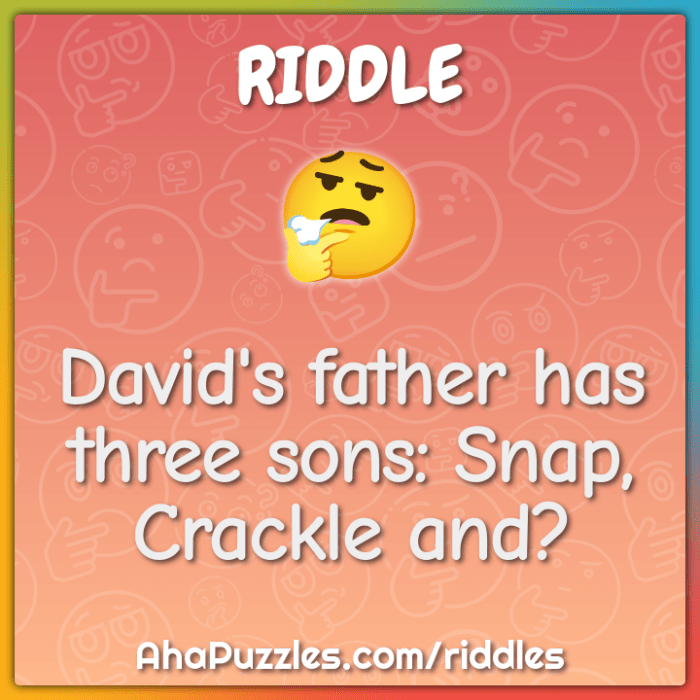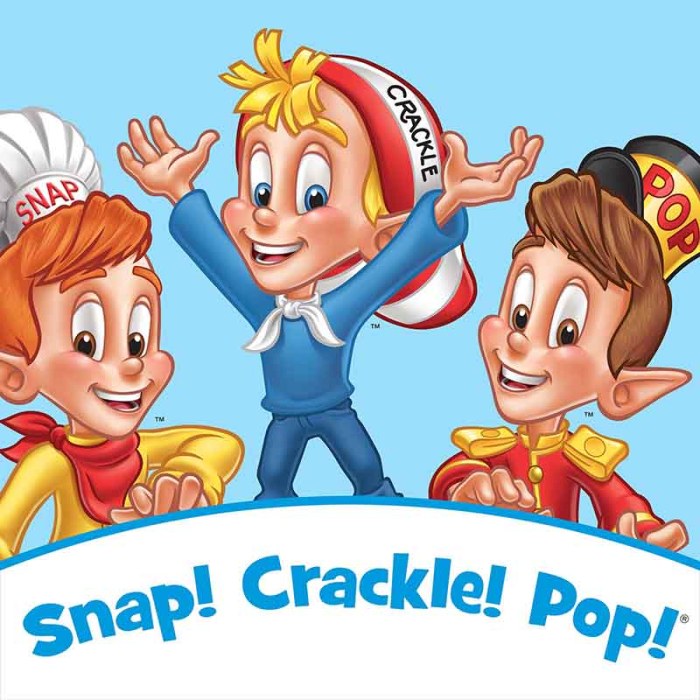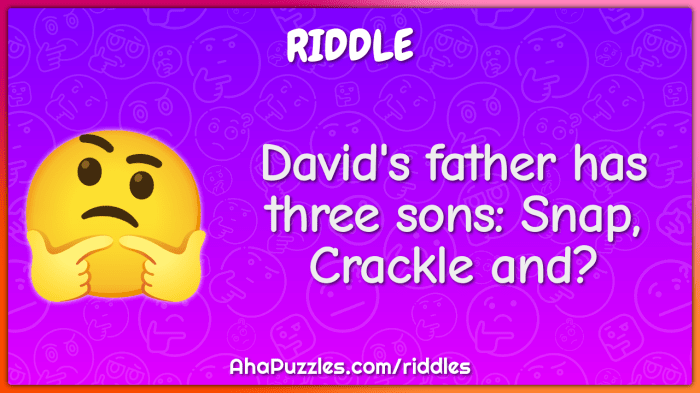David’s father has 3 sons snap crackle and – David’s father has three sons: Snap, Crackle, and… who’s the third son? This riddle has puzzled and amused people for generations, and its origins and significance are shrouded in mystery. Let’s delve into the literary devices, cultural impact, and modern interpretations of this enigmatic phrase.
The phrase “David’s father has three sons: Snap, Crackle, and ______” is a classic example of alliteration, a literary device that uses the repetition of consonant sounds to create a pleasing effect. The phrase also employs wordplay, as the third son’s name is not explicitly stated, leaving the listener or reader to ponder its identity.
Introduction
The phrase “David’s father has 3 sons: Snap, Crackle, and ______” is a well-known riddle that has been passed down for generations. The riddle plays on the alliteration of the names Snap, Crackle, and Pop, which are the names of the three mascots for the cereal Rice Krispies.
The significance of the riddle lies in its ability to test one’s knowledge of the cereal and its mascots. It is also a fun and engaging way to introduce children to the concept of alliteration and wordplay.
Literary Analysis: David’s Father Has 3 Sons Snap Crackle And

The phrase “David’s father has 3 sons: Snap, Crackle, and ______” is a classic example of alliteration, a literary device that uses the repetition of consonant sounds in close proximity. The repetition of the “s” sound in the names Snap, Crackle, and Pop creates a sense of rhythm and flow that makes the phrase easy to remember.
The structure of the phrase is also significant. The use of the colon separates the first part of the phrase from the punchline, creating a sense of anticipation and suspense. The rhythm of the phrase is also important, as the stressed syllables in the names Snap, Crackle, and Pop fall on the same beat, creating a sense of momentum.
Cultural Impact

The phrase “David’s father has 3 sons: Snap, Crackle, and ______” has had a significant cultural impact. The phrase has been used in popular culture for decades, appearing in movies, TV shows, and music.
The phrase has also been used in advertising, most notably in the Rice Krispies commercials. The commercials feature the three mascots, Snap, Crackle, and Pop, who use the phrase to promote the cereal.
Modern Interpretations

In recent years, the phrase “David’s father has 3 sons: Snap, Crackle, and ______” has been reinterpreted in a number of ways. Some modern interpretations of the phrase include:
- The phrase has been used to represent the diversity of the American family. In this interpretation, Snap, Crackle, and Pop represent three different types of people who can come together to form a family.
- The phrase has also been used to represent the power of friendship. In this interpretation, Snap, Crackle, and Pop represent three friends who are always there for each other.
- The phrase has even been used to represent the importance of individuality. In this interpretation, Snap, Crackle, and Pop represent three unique individuals who are proud of who they are.
Educational Value

The phrase “David’s father has 3 sons: Snap, Crackle, and ______” can be used to teach a number of concepts, including:
- Language: The phrase can be used to teach children about alliteration and wordplay.
- Literature: The phrase can be used to teach children about the structure and rhythm of language.
- Cultural history: The phrase can be used to teach children about the history of Rice Krispies and its mascots.
The phrase can also be used to develop children’s critical thinking skills. By asking children to come up with their own interpretations of the phrase, teachers can encourage children to think creatively and to develop their own ideas.
Quick FAQs
Who is the third son in the riddle?
The riddle does not provide an answer to the third son’s identity, leaving it open to interpretation.
What is the origin of the riddle?
The exact origin of the riddle is unknown, but it has been circulating for centuries.
Why is the riddle so popular?
The riddle’s clever use of alliteration and wordplay, combined with its enigmatic nature, makes it both entertaining and thought-provoking.